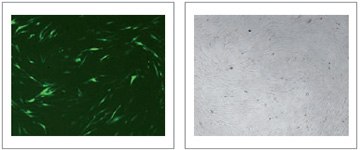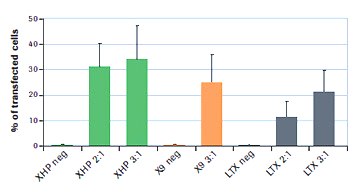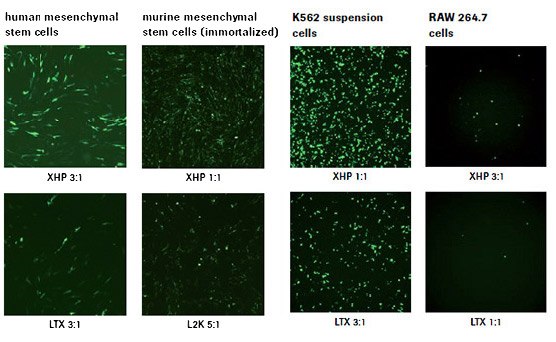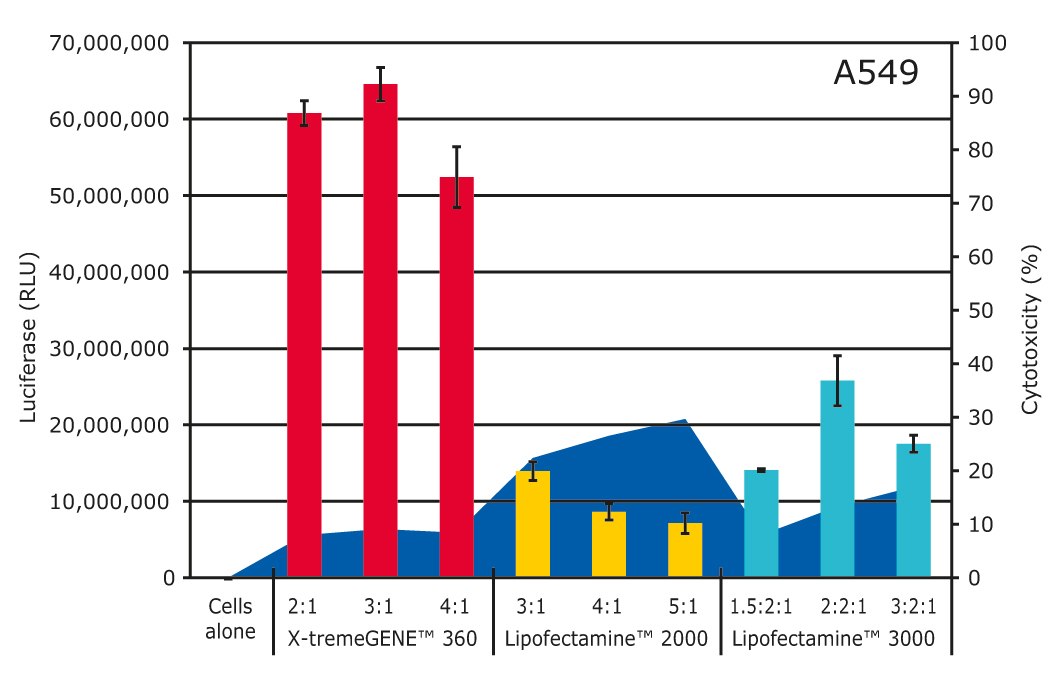X-tremeGENE™ Transfection Reagents
Understanding the Mechanisms of Transfection
Learn how optimizations like reagent selection, DNA/RNA : transfection reagent ratio, and protocol/method are critical determinants of transfection efficiencies.
X-tremeGENETM HP, X-tremeGENETM 9, and X-tremeGENETM 360 transfection reagents
The ability to successfully transfect a cell varies significantly depending on the cell type, protocol, and the composition of the transfection reagent. X-tremeGENE™ transfection reagents are designed to efficiently transfect common and difficult-to-transfect cells with a variety of molecules, including DNA, small RNAs, and CRISPR/Cas9 components.
X-tremeGENE™ 360 Transfection Reagent is a high-performing, versatile and reliable solution for delivery of siRNA/miRNA, plasmid DNA, and CRISPR/Cas9 materials into hard-to-transfect and common cell types. For more information visit sigmaaldrich.com/xtg360ro.
Section Overview

Figure 1.X-tremeGENE™ HP Reagent efficiently transfects human primary fibroblasts.
Primary fibroblasts were isolated from human foreskin and transfected with 4 μL X-tremeGENE™ HP Reagent and 1 μg of GFP-encoding plasmid DNA in a 6-well cell culture plate. GFP expression was visualized 48 hours after transfection. The left panel shows GFP fluorescence, and the right panel shows the corresponding brightfield image.

Figure 2.X-tremeGENE™ HP and X-tremeGENE™ 9 Reagents outperform the competitor reagent in human mesenchymal stem cells.
Human mesenchymal stem cells were isolated from bone marrow aspirate of four different donors. Cells were transfected using X-tremeGENE™ HP Reagent (XHP), X-tremeGENE™ 9 Reagent (X9), and a competitor reagent (LTX), using the indicated ratios (μL reagent : μg GFP-encoding plasmid DNA. Ratio 2:1 was not tested using X-tremeGENE™ 9 Reagent). Untransfected cells served as control (neg). FACS analysis was performed 48 hours after transfection.

Figure 3.X-tremeGENE™ HP DNA Transfection Reagent outperforms competitor reagents in difficult-to-transfect cell types.

Figure 4.X-tremeGENETM 360 outperforms Lipofectamine reagents tested in A549 cells. A549 cells were transfected with luciferase encoding plasmid DNA using either X-tremeGENETM 360, Lipofectamine® 2000 (Thermo Fisher Scientific) or Lipofectamine® 3000 (Thermo Fisher Scientific) for 24 hours at indicated reagent-to-DNA ratios. Transfection was measured by luciferase activity using a conventional assay. Cytotoxicity was assessed by quantifying the LDH release from the cytosol of damaged cells compared to cells alone. Higher transgene expression and lower cytotoxicity was observed in cells transfected with X-tremeGENETM 360 at optimal ratios compared to cells transfected with Lipofectamine® 2000 or Lipofectamine® 3000.
Cells were transfected using X-tremeGENE™ HP Reagent (XHP), and competitor reagents (LTX and L2K), at the indicated ratios (μL reagent : μg GFP-encoding plasmid DNA). Transfection efficiency was visualized using GFP fluorescence microscopy.
Note: The above data was produced using either a GFP-encoding pcDNA3.1 plasmid or a luciferase-encoding pCI plasmid, both with the cytomegalovirus (CMV) promoter. These recommendations are guidelines based on experimental findings. The optimal reagent:DNA ratio must be determined empirically.
To continue reading please sign in or create an account.
Don't Have An Account?